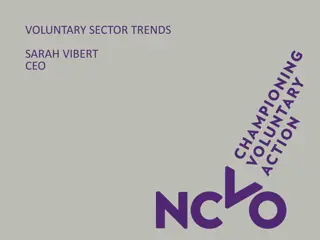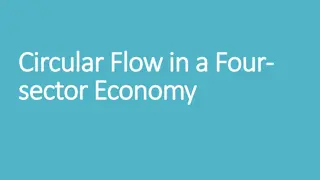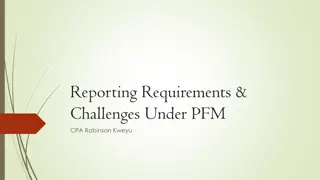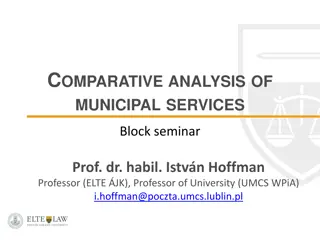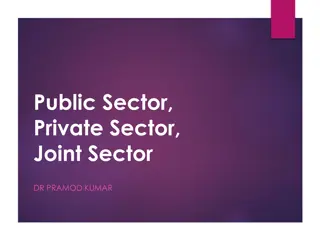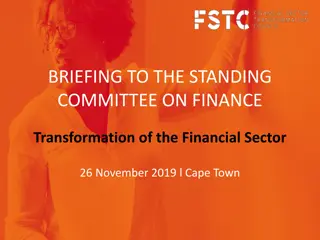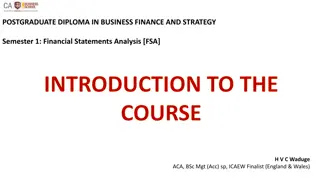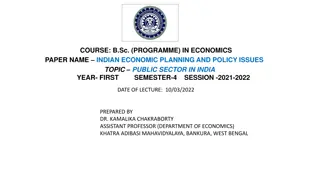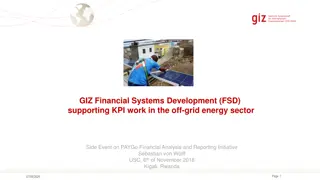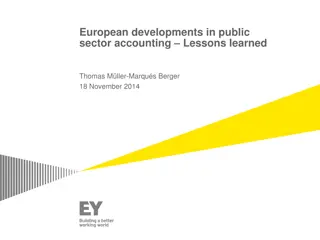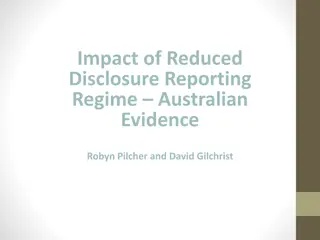Challenges in Public Sector Financial Management
The late Kimi Makwetu highlighted concerns regarding accountability in managing public funds, emphasizing the rise in unauthorised, irregular, and wasteful expenditures. The audit findings for 2019/2020 reveal staggering amounts of mismanaged funds in national and provincial government entities, indicating a poor track record in dealing with financial irregularities.
Download Presentation

Please find below an Image/Link to download the presentation.
The content on the website is provided AS IS for your information and personal use only. It may not be sold, licensed, or shared on other websites without obtaining consent from the author.If you encounter any issues during the download, it is possible that the publisher has removed the file from their server.
You are allowed to download the files provided on this website for personal or commercial use, subject to the condition that they are used lawfully. All files are the property of their respective owners.
The content on the website is provided AS IS for your information and personal use only. It may not be sold, licensed, or shared on other websites without obtaining consent from the author.
E N D
Presentation Transcript
UIFW Supply Chain Management Capacity Building Programme
INTRODUCTION The late former Auditor-General Kimi Makwetu once said, The very existence of such expenditure suggests that those who persistently incur it are not bothered as long as there is no accountability or consequences This indicates that people entrusted with public money do not always carry this task with the level of care required by the country s Constitution. The issue is not about whether there is such a thing as a clean audit or it does not necessarily mean money was lost or there was no fraud and corruption involved or there was value for money received these are just lame defences for UIFW incurred. It makes it seem that accountability and due care in managing public resources are not part of the overall objective. Suppliers are being paid far more than the amount to which was initially agreed. Extensions and variations on contracts without following prescribed regulations are prevalent and pervasive. There is a widespread lack of proper and verifiable documentation to substantiate commitments and transactions. Ultimately service delivery is affected and our poor and vulnerable people suffer the most. 2
QUICK DEFINITIONS OF UIFW Unauthorised Expenditure: Expenditure incurred by departments, SOE s and municipalities that is more than the budget or not in accordance with the purpose of the budget. Irregular Expenditure: Non-compliance with legislation in the process leading to expenditure. Fruitless & Wasteful Expenditure: Expenditure made in vain and could have been avoided if reasonable care was taken. In about 2013, we could see that there was a certain level of financial discipline with the measures instituted by the treasury and the work the auditor general s office was doing It was scary to watch how this changed. Oversight systems were being reversed so quickly, and supervision was regressing fast. Huge amounts of money were slipping through. This happened in a very short period. Monies were being dispersed to third parties that had nothing to do with the state or the suppliers. Kimi Makwetu 3
2019/2020 2019/2020 AUDIT AUDIT FINDINGS FINDINGS
NATIONAL & PROVINCIAL GOVT: 2019/2020 Unauthorised expenditure R18.12 billion Increased by 998% Irregular expenditure R54.34 billion Decreased by 19% Fruitless & Wasteful Expenditure R2.39 billion Increased by 1% TOTAL UIFW R74.85 billion Increased by 5.6% Poor track record in dealing with irregular expenditure and ensuring accountability. The year end balances had accumulated over several years and had not been dealt with through recovery, condonement or write-off and stood at R262.03 billion. These amounts could be higher as 118 or 31% of the auditees were qualified due to incomplete irregular expenditure being disclosed and over R2 billion in contracts could not be audited due to missing information. It takes time to discover our ignorance. I have come to learn that I am not speaking only to accountants or economists when I deliver the results. So I cannot use the jargon to describe the daring behaviour that we see in the entities we audit. The language has to be understood by that man who opens up a tap and no water comes out. Kimi Makwetu 5
MAIN CAUSES Irregular expenditure: - Non-compliance with SCM legislation (91%): not following competitive bidding or quotation processes; and, inadequate contract management. - Overspending of budgets and grants that is not unauthorized expenditure. - Expenditure related non-compliance errors in disbursements, such as NSFAS. Unauthorised expenditure: - 100% related to overspending of the budget Fruitless & Wasteful expenditure: - Penalties and interest on overdue accounts and late payments - Litigation and claims 6
SOEs 2019/2020 irregular expenditure R68 billion. However, Transnet and Eskom were not audited in 2019/2020, but their financial statements disclosed combined irregular expenditure of over R75 billion. 7
LOCAL GOVERNMENT Unauthorised expenditure R22 billion Irregular expenditure R26 billion Fruitless & Wasteful Expenditure R3.47 billion TOTAL UIFW R51.47 billion Poor track record in dealing with irregular expenditure and ensuring accountability. The year end balances had accumulated over several years and had not been dealt with through recovery, condonement or write-off and stood at R79.22 billion. These amounts could be higher as several municipalities were qualified due to incomplete irregular expenditure being disclosed. "It means that you will struggle to fix any issues raised by the auditors, recover money that is unaccounted for, or to make sure that the money goes where it was intended to go. Because the guys in the internal audit function will only tell you where the problem is. They are not there to make sure that the deployment of the requisite controls is sufficiently tackled. Kimi Makwetu 8
MAIN CAUSES Irregular expenditure: - Non-compliance with SCM legislation : not following competitive bidding or quotation processes; inadequate contract management; and, no valid tax clearance certificate. Unauthorised expenditure: - 100% related to overspending of the budget Fruitless & Wasteful expenditure: - Penalties and interest on overdue accounts and late payments - Litigation and claims - payments to suspended employees - write-off of assets that were never used PS: The main causes are similar in national and provincial government, as well as local government. 9
SOME ROOT CAUSES Uniformity in the interpretation of SCM Policies & procedures Compliance with legislative framework Evaluation & adjudication of contracts according to the prescribed criteria Compliance of statutory requirements Extension of Validities Proper scoring of points (functionality & preference) Monitoring projects against the procurement plan Projects at bid committee system (value chain from approval by BSC to award stage) Letters of appointment Extension of contracts major & minor contracts Extension of time with no financial implications Alignment of projects ( a contractor has been appointed but there are no Professionals) Poor Contracts management Expired contracts 10
WHAT IS THE PROBLEM? The problem can only relate to: - policies and legislative framework; - processes, procedures and systems; or - people We have created an enabling legislative framework that includes our supreme Constitution, PFMA, MFMA, MPRA, etc, which are world class and in line with global best practices. We have presented these pieces of legislation and the accompanying regulations and policies with pride internationally and they were very impressed. Further, we have very good systems, processes and procedures that have been benchmarked and even meet ISO standards in some instances. Cities are spending around 5% of their budgets on IT.
WHAT IS THE PROBLEM? The problem is PEOPLE. The problem is YOU and ME. The problem is not government as they have given us everything. It is US. Former Finance Minister Nhlanhla Nene revealed that more than half the country s municipal managers and chief financial officers do not have the minimum competency levels to do their jobs. Only 94 of 193 municipal managers and 79 of 218 chief financial officers are properly qualified. However, we have the right legislative framework, meet the technical requirements and qualifications, have the right systems and processes, as well as meet the minimum competency requirements, but we are still ineffective. It is a behaviorial issue. Based on investigation reports, willful neglect and fraud and corruption in some instances. Need open and honest discussion to get to the bottom of this and root it out. What can we do?
TURNAROUND STRATEGY Consequence and performance management is key PEOPLE issue. A very strong focus on proper planning, implementation, monitoring, continuous improvement, and alignment. Poor planning to be addressed PEOPLE issue. Improve contract management and project management PEOPLE issue. Focus on the Big 4/5 Units, such as Electricity, Water & Sanitation, Human Settlements, ETA and IMU and identify repeat offenders PEOPLE issue. Improved budget and expenditure control to ensure that unbudgeted expenditure is not incurred. Where have our professional finance staff been? PEOPLE issue. Blacklisting of companies must take place effectively. Why is this not happening? a PEOPLE issue. SCM delays must be prevented, especially in the evaluation of tenders a PEOPLE issue. Must focus on MI (material irregularities) to ensure value for money a PEOPLE issue. Strong internal controls will help but not if there is collusion a PEOPLE issue. 13
PREVENTATIVE CONTROLS Preventive controls discourage the emergence of material irregularities. If properly designed and implemented, such controls would detect most material irregularities that could result in a financial loss. This is relatively cheaper than relying on investigations that would be triggered after money has changed hands. For a regime of preventive controls to see the light of day, a strong tone at the top and an ethical culture must be the concrete foundation on which such a discipline is built. Strong leadership and ethics is a PEOPLE issue. Where preventive controls are implemented with diligence, they become a natural source of consequences. So, there will be no need to debate consequence management consequences will simply be part of the outcome. Strong preventive controls create tension especially when consequences are part of the deal. It is the positive and progressive tension that must be embraced as it makes preventive controls work for the entire value chain. 14
SCM ROOT CAUSES CONTROL / STRATEGY Inadequate contract management process Increase capacity of the SCM Unit to improve the level of support to line departments. Contract duration not effectively monitored Automate contract management processes. Contract renewal processes are not timeously carried out by line departments resulting in delays in SCM processes relating to the renewal or awarding of contracts. Set up framework contracts for various services to minimize the use of s36 and irregular expenditure. Failure to allow for appropriate SCM processes allocation of projects outside of contract scope, three quotations not being obtained, adverts not adequately advertised, MBO s and tax compliance PIN not submitted by tenderer. Tenderers be requested to provide hard and soft copies of tender documents to minimize limitation of scope matters and missing tender information. Improve oversight and monitoring of SCM processes, committees and procurement planning. Bid evaluation criteria in the tender evaluation are inconsistent with evaluation criteria stipulated in the tender document and SCM processes incorrectly applied in evaluation. Review all irregular expenditure contracts and develop mitigation strategies to migrate services to new contracts acquired in line with SCM processes. Inappropriate use of s32, s36 and s38. Improve segregation of duties across the SCM value chain, including demand management, acquisitions, contract management and disposals. Failure to declare conflict of interest. Alleged fraud and corruption lack of consequence management. 15
SCM Contd ROOT CAUSES CONTROL / STRATEGY Implement consequence management in line with approved framework. All UIFW matters must be referred to the Finance Disciplinary Board to provide recommendations regarding any disciplinary action to be taken. All consequence management cases must be independently administered to ensure that all cases are fast tracked and taken to their conclusion. Enforce the preparation of adequate procurement plans, including procurement timetables. Only projects with procurement plans must be included in the budget. Pre-checking of all directors and members of companies doing business with the Council must be done prior to the awarding of any tender. Disclosure of interest forms must be sent to employees to update their declarations. A Conflict Of Interest Task Team must be set up to suspend entities on the supplier database and financial management system and to recommend entities for blacklisting to the Blacklisting Committee. Efforts to improve and automate contract management processes must be the key, amongst other initiates, due to the role of contracts management as a major catalyst for irregular expenditure. The automation and modernization of processes projects and other initiatives by the unit to improve the internal control environment must continue to be pursued. 16
EXPENDITURE ROOT CAUSES CONTROL / STRATEGY No valid contract to procure MFMA s33 and/or s116. Implement and monitor automated budget controls. Failure to follow SCM process. Pre-budget checks by accounting staff to ensure that the necessary funding and bid processes are being followed . No delegation of authority to procure or authorize payment. Consultation with line departments to review and reprioritize their business plans and budgets within the available resources to prevent unauthorized expenditure. Procuring from incorrect vote. Third party claims that were not budgeted for. Duplicate payments. Monthly budget versus actual comparison reports must be strictly monitored, including timely recording and accounting for accruals to enhance budget monitoring. Payment no existing contract. Late payments - failure to pay by the due date resulting in interest, fines, penalties, or court orders. Line departments must be constantly informed to ensure that the adjustments budget process is followed to avoid recurring unauthorized expenditure. Expenses which are not in the best interests of the municipality. An annual spend analysis report for each line department must interrogated to determine the spend on contracts, including framework contracts for repetitive or emergency work, such as infrastructure repairs and maintenance. Failure to follow SCM and/or MFMA processes with regards to budget management and budget commitments. 17
INTERNAL CONTROL The Internal Control Unit must implement the a revised UIFW process to account for UIFW in an appropriate manner in line with the new SOP. Aligned to this is a reduction strategy must be approved by Council and submitted to National Treasury. This strategy must have the effect of fast tracking the UIFW expenditure to MPAC to determine write-off/ recovery of the expenditure. In addition, all UIFW matters must be considered acts of financial misconduct and must be referred to the Finance Disciplinary Board to advise on the disciplinary processes to be implemented through Council. Our reports are very clear about what should happen, based on what we have found. There must be consequences. The arrests are a culmination of things, including the work of law enforcement. And, naturally, that is how it should work: that we do our bit and highlight these irregularities and the law enforcement teams conduct further investigations and arrests. If they need us to clarify any issues, we will. Kimi Makwetu 18
DETECTION OF UIFW The 2019/2020 audit findings off National and Provincial governments indicate that 79% of irregular expenditure, 99% of unauthorized expenditure and 83% of fruitless and wasteful expenditure were detected by auditees. We need to improve this further. Before payment is made at Accounts Payable, they must check, inter alia, that there is a contract in place, the contract has not expired, the letter of award, and SCM processes have been followed. At the ordering stage, checks must be made by accountants for contracts under R200 000 that 3 quotes have been obtained. CIIU from their investigations must identify if any expenditure constitutes UIFW. Internal Control must check all s36 reports to determine if there is any UIFW. Internal Audit must identify any UIFW emanating from their audits. The Heads of each line department must on a monthly basis submit expenditure control certificates and declare any UIFW incurred. 19
PUBLIC AUDIT ACT AMENDMENTS The intervention of the Public Audit Act amendments seeks to achieve what is traditionally the role of those charged with oversight if this task is carried out with due care, diligence and professional competence. These amendments introduced the concept of a material irregularity in the audit of the financial statements. The Auditor-General is empowered, once a material irregularity has been identified or is suspected, to: - Refer any suspected material irregularity identified to a relevant public body for investigation, and the relevant public body must keep the Auditor-General informed of the progress and the final outcome of the investigation; - Take any appropriate remedial action; and - Issue a certificate of debt, as prescribed, when an accounting officer or accounting authority has failed to comply with remedial action. 20
FINANCIAL MISCONDUCT An accounting officer commits an act of financial misconduct if he/she deliberately or negligently contravenes a provision of the MFMA, makes or permits or instructs another official to incur UIFW expenditure, provides incorrect or misleading information to the mayor, council, AGSA, National Treasury or other organs of state and the public. You would have seen in the news recently the case of an Eastern Cape municipal manager being arrested in November 2021 by the Hawks for flouting the MFMA by overseeing a tender of R18 million increasing to over R36 million under his watch. We had to show Parliament over a three-year period that the outcomes were becoming worse. There were ever-escalating levels of irregular expenditure. Year in and out, the outcomes deteriorated and we couldn t keep watching this happen. Accounting officers now know that if they do not address the oversight issues it will hit them in their own pocket. It is using the law with a bit of persuasion. Kimi Makwetu on the Public Audit Act Amendments 21
CONCLUSION Develop a UIFW prevention, detection and reduction strategy. Internal controls help, but it is a people issue. Effective consequence management is key. Ensure Finance Disciplinary Board is effective. Blacklist suppliers. Improve contract management. Automate processes and track bid process. Framework contracts to reduce abuse of s36. Segregation of duties in SCM value chain. Improve planning procurement plans with budget. Pre-check directors and members of entities doing work with the municipality or department. Improve budget and expenditure control. CIIU, Internal Audit and Internal Control to assist Expenditure & SCM to detect UIFW. 22
THE END 23














